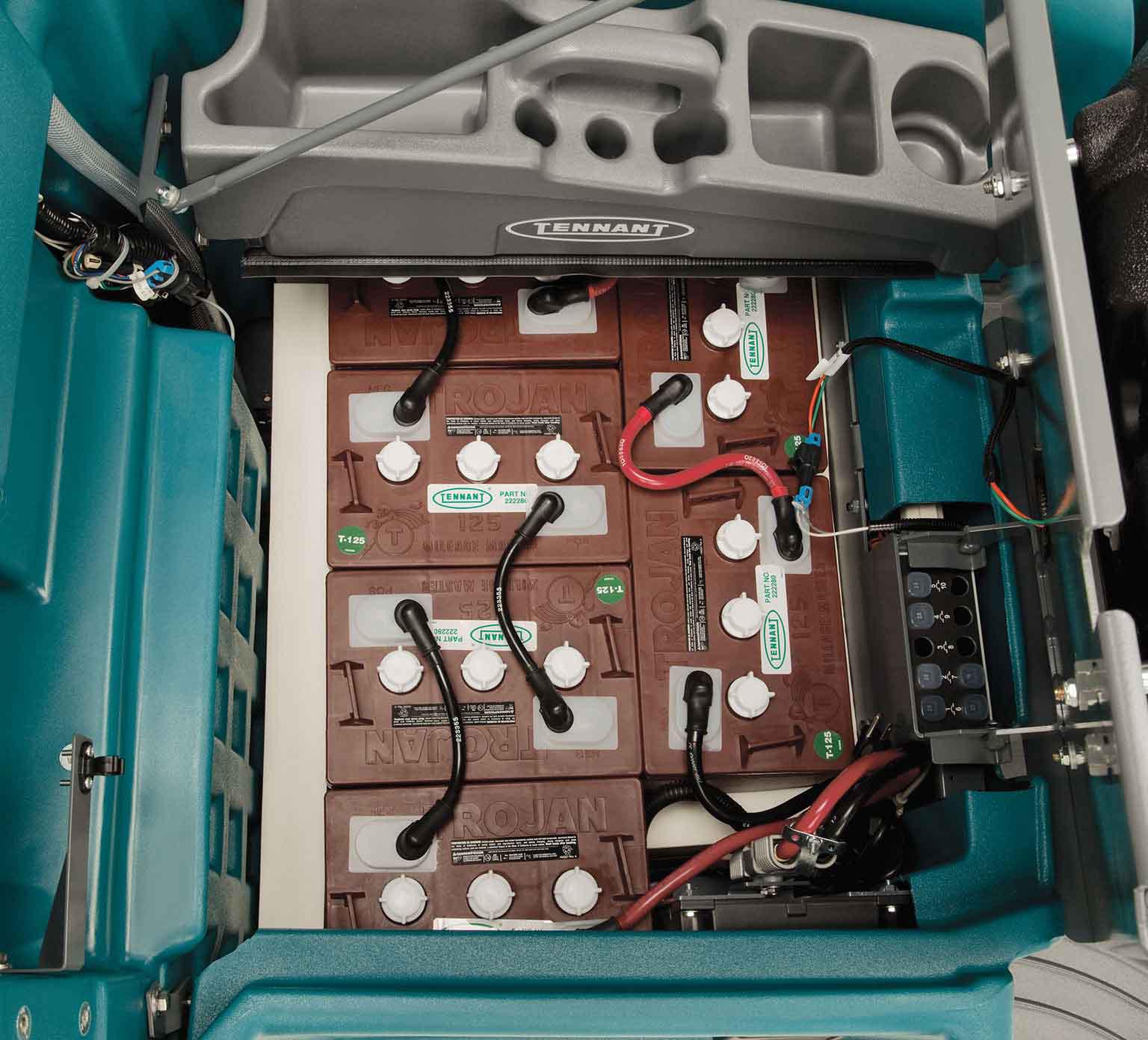
Battery-operated floor cleaning machines are an efficient way to sweep and scrub any type of industrial flooring. These floor scrubbers and sweepers can cover large areas quickly and thoroughly without the hassle of a cord or the expense and storage space required by a ride-on machine. But battery-operated floor scrubbers need to be operated and maintained by those with proper training in order to keep batteries charged and running smoothly.
It’s important for anyone working with battery-operated floor cleaning machines to first know which type of battery the equipment uses, as each function slightly differently and may require unique handling and storage requirements.
Types of Floor Scrubber Batteries
Flooded Lead-Acid Batteries
Flooded lead-acid batteries, or “wet cell” batteries, are commonly used on floor cleaning machines like the PowerBoss Admiral 32 XL. These batteries are inexpensive and reliable, but you must top them off periodically with distilled water. Always make sure to store wet cell batteries upright in a well-ventilated area
Absorbent Glass Mat Batteries
Absorbent glass mat (AGM) batteries don’t need to be topped off with water so they are relatively maintenance-free. They are more environmentally friendly than wet cell batteries, but are more expensive and not likely to last as long. Avoid over-charging AGM batteries which could lead to premature failure.
Lithium Ion Batteries
Lithium ion batteries are lightweight and offer significantly longer run times than other types of batteries. They are a great option for compact walk-behind scrubbers like the Bulldog WD20. Lithium ion batteries are generally maintenance-free and becoming a common replacement for lead-acid batteries, but are typically more expensive.
Guidelines for Safe Battery Maintenance and Storage
Batteries can pose significant chemical hazards, so OSHA has laid out a number of guidelines for safe handling. Here are five recommendations for safety and efficiency when using battery-operated floor cleaning machines:
Practice safe usage:
Make sure all battery cables are disconnected before working on it, and never lean over a battery, to minimize the exposure area in case of an acid leak. Take care when lifting batteries, as they can be quite heavy and dropping the unit could result in a chemical hazard. In the event chemicals do make contact with your skin, use cool water for at least 15 minutes and then immediately seek medical help.
If your battery-operated floor scrubber or sweeper uses wet cell batteries, check water levels frequently and periodically add distilled water – only when the battery is fully charged. Cells should be filled to about 1/4” above the lead plates. Be sure to follow the instructions for watering your brand of battery. To cut down on potential user error, some floor cleaning machines like the Tennant T500/T500e feature an automatic battery-watering system that reduces the need for frequent checking and refilling.
Follow storage standards:
Battery-operated floor cleaning equipment should be stored in cool, dry areas, ideally at room temperature. The batteries should be allowed to fully cool after use before storage. Avoid exposure to radiators or other heat sources. Additionally, wet cell batteries must be kept upright.
It is important to charge the battery periodically when keeping your industrial floor scrubber or sweeper in storage for long periods of time. Batteries will naturally discharge slowly over time. Letting the battery completely discharge is an expensive mistake because you will have to replace it!
Wear PPE:
OSHA suggests that personal protective equipment (PPE) should always be used when working with batteries. This includes splash goggles to protect eyes from potential chemical exposure, as well as a face shield. Acid-resistant equipment, including gloves and an apron, should also be used, and workers should never tuck pant legs into boots, as that style can allow for spilled acid to pool. Additionally, maintenance tools for the battery should be covered with electrical tape to reduce the risk of sparking.
Charge smartly:
Don’t allow the battery to drain by more than 80% before recharging it. This can prolong the life of the battery and reduce overall maintenance costs.
Don’t overcharge your batteries:
Almost all deep cycle battery chargers have an automatic shut off feature. However, charging your batteries too frequently will shorten their life.
Apart from following these basic guidelines for safety, check your floor scrubber or sweeper user manual for specific recommendations that will help you properly charge and maintain your battery to prolong the life of your equipment.

